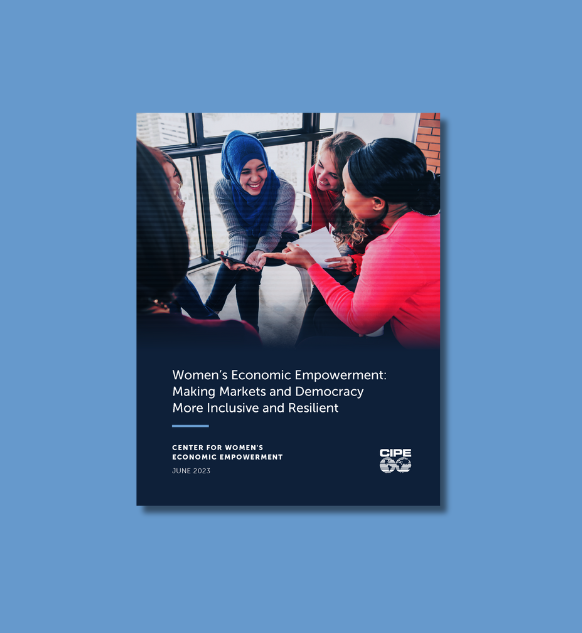Women, Money, & Democracy: Introduction & Context
 Championed through a bipartisan effort led by former U.S. House of Representatives Foreign Affairs Committee Chairman Ed Royce (R-CA) and Rep. Lois Frankel (D-FL), the Women’s Entrepreneurship and Economic Empowerment Act became law on January 9, 2019. The legislation created a statutory requirement to expand USAID’s assistance to microenterprises to include small and medium-sized enterprises (SMEs) and stipulated that 50 percent of resources supporting SMEs should reach enterprises owned, managed, or controlled by women. At the time, the Trump Administration responded by creating the Women’s Global Development and Prosperity Initiative (W-GDP), a whole-of-government approach to advance women’s economic empowerment (WEE) that included an assistance fund managed by USAID.
Championed through a bipartisan effort led by former U.S. House of Representatives Foreign Affairs Committee Chairman Ed Royce (R-CA) and Rep. Lois Frankel (D-FL), the Women’s Entrepreneurship and Economic Empowerment Act became law on January 9, 2019. The legislation created a statutory requirement to expand USAID’s assistance to microenterprises to include small and medium-sized enterprises (SMEs) and stipulated that 50 percent of resources supporting SMEs should reach enterprises owned, managed, or controlled by women. At the time, the Trump Administration responded by creating the Women’s Global Development and Prosperity Initiative (W-GDP), a whole-of-government approach to advance women’s economic empowerment (WEE) that included an assistance fund managed by USAID.
The Biden Administration has continued this approach and preserved the role of the fund, which has been renamed the Gender Equity and Equality Action Fund. The administration made a $3.1 billion budget request to Congress across all accounts for the fiscal year 2024 to advance gender equality and opportunity for women and girls, including combatting gender-based violence, strengthening women’s participation in peace and security efforts, and empowering women economically. Women’s economic security is a rallying point for politicians, practitioners, and assistance implementers not simply because it is the right thing to do; it is also smart economics and smart politics. Ultimately, when given economic opportunities, women diversify free markets and democracies and ensure that societies become more inclusive and resilient.
Gender equality matters because having the ability to live a life of one’s choosing, to pursue opportunities, and to be spared from discrimination is a human right. It’s also smart economics: the presence of more women in management and leadership positions diversifies business sectors and builds inclusive teams that improve productivity. Diverse and inclusive business sectors help protect households and markets from economic shocks and improve the productive potential of future generations. Gender equality can also make public institutions more representative while enhancing development outcomes.
Providing equal access to economic opportunity, entrepreneurial activity, and resources boosts inclusive economic growth and productivity. Women’s economic empowerment also has far-reaching impacts beyond the marketplace. Collective advocacy by women in business has the power to shape institutions, markets, and social norms that limit a woman’s individual agency, thereby strengthening the pillars of democracy in a country. Women’s political interests and capital, for instance, increase as women become economically empowered, improving their visibility and credibility as community leaders. Additionally, empowering women as economic and political actors affects policy choices while making institutions more representative of a broader range of community voices. Moreover, by contributing to improvements in various human development indicators and corporate performance, advancing women’s rights in the marketplace and in politics makes democracy more effective. Women’s economic empowerment boosts the diversity, inclusivity, and resilience of democracy itself.
This article documents how and why women’s economic empowerment can engender such economic and democratic outcomes. It makes clear why donors and civil-society organizations dedicated to human rights, economic development, or democracy should prioritize investments in WEE programs. The Center for International Private Enterprise (CIPE) designs and implements projects that operate at the intersection of economics and politics, and WEE programming is a global priority. Made possible by visionary investments by the Office of Global Women’s Issues (S/GWI) and the Bureau of Democracy, Human Rights and Labor (S/DRL) at the U.S. Department of State, as well as by the Australian Department of Foreign Affairs and Trade (DFAT) and the National Endowment for Democracy (NED), CIPE projects in this space can help democracy engender the freedom and opportunity required for all to prosper.
“Women’s economic empowerment boosts the diversity, inclusivity, and resilience of democracy itself.”
Published Date: July 13, 2023
